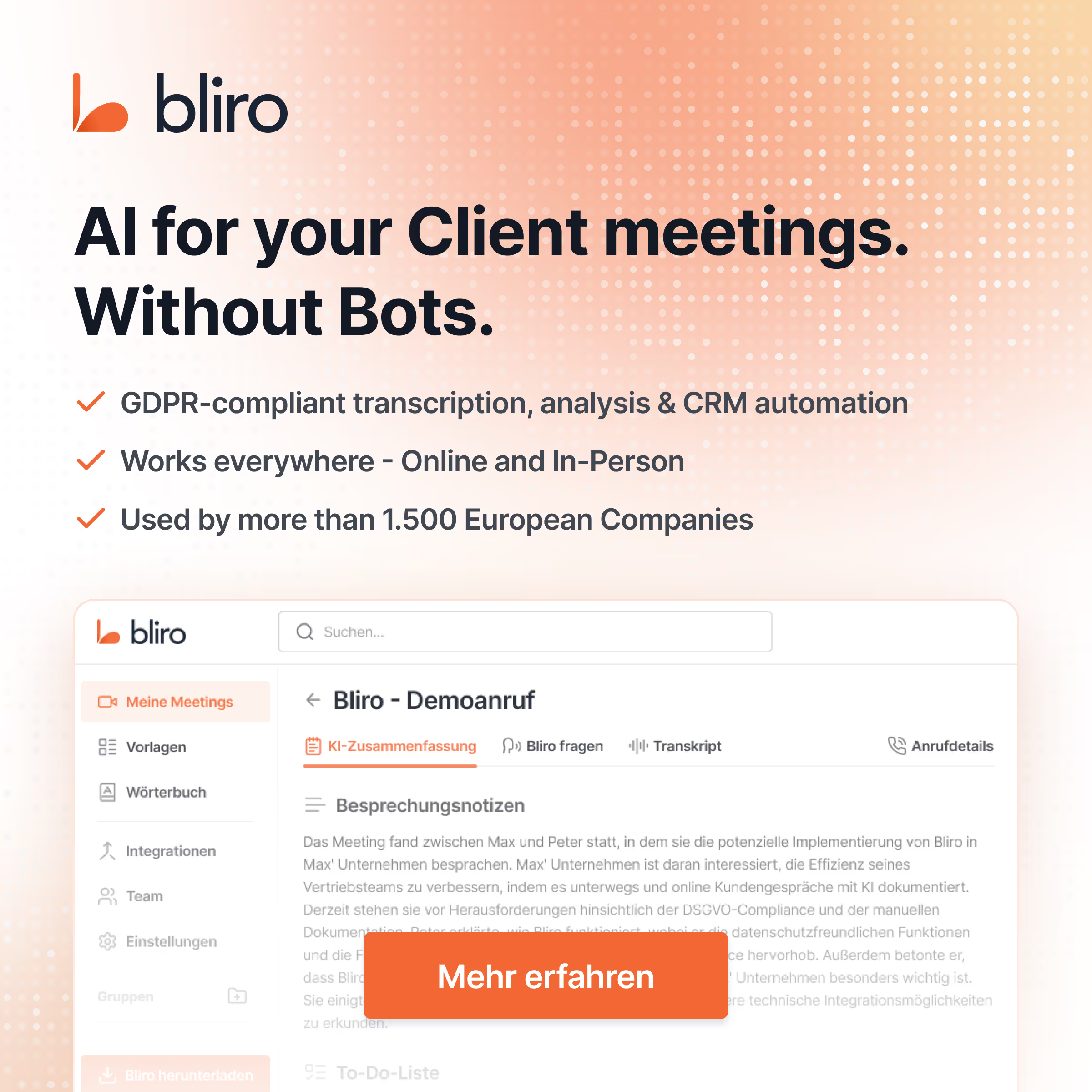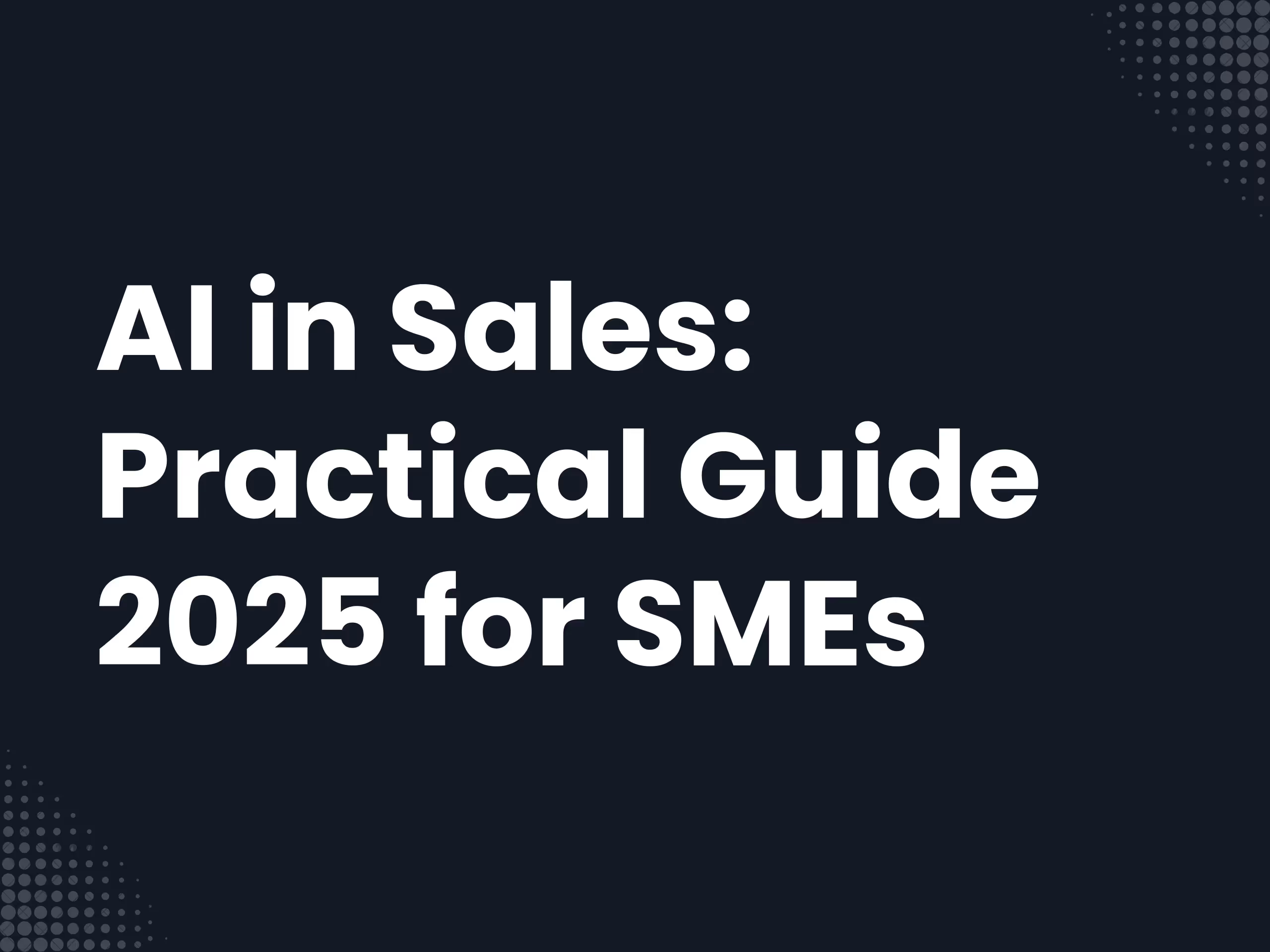AI in sales is rapidly changing the business world - in fact, sales teams can achieve productivity gains of up to 40% as a result. What is surprising, however, is that sales employees spend an average of only 28% of their working time actually selling, while the rest is lost on administrative tasks, data maintenance or searching for information.
Although the global acceptance and implementation of AI is increasing exponentially, 52 percent of the small and medium-sized companies surveyed are still in the phase of experimenting with AI applications. However, the right use of AI can bring huge benefits - from automating time-consuming tasks to intelligently prioritizing leads. Medium-sized companies in particular can gain significant competitive advantages through targeted AI implementation. A practical example: Through AI-based route planning, a grocery store chain was able to reduce its routes by 15% and achieve an overall ROI of 900%.
This guide shows you how to use AI effectively in sales, what practical use cases there are and what SMEs need to pay attention to when implementing it. From automated lead scoring to intelligent call logs - you will receive concrete recommendations for action for your AI strategy in sales 2025.
Why AI in B2B sales is now crucial for SMEs

German medium-sized companies are facing a turning point: Traditional B2B sales are fundamentally changing - and AI is becoming a decisive competitive factor.
Digitalization and increasing customer expectations
The digital transformation in B2B business has taken place a long time ago. Remarkable: 57% of the purchasing process is already completed before decision makers contact a sales representative for the first time. In fact, most B2B buying decisions are now made online - without any direct contact between buyer and sales.
This development continues to accelerate. According to a McKinsey study, almost 80% of decision makers prefer digital processes and the ability to maintain customer relationships remotely. Only around 20% of B2B buyers hope that personal sales calls will dominate again.
An important driver of this change: The millennial generation is increasingly taking on decision-making positions. In the USA, 46% of those who influence B2B decisions are already under 35 years of age. These digital natives expect the same seamless digital experiences from their business partners that they know from the B2C sector - from self-service portals to 24/7 availability.
Shortage of skilled workers and time pressure in sales
At the same time, the staff shortages are dramatic. A quarter of all German workers are over 55 years of age and will leave the labour market in the next decade. The consequences are already being felt: more than half of small and medium-sized enterprises expect difficulties in filling jobs over the next five years.
This has concrete effects on business activities. 40% of these companies expect to be able to accept fewer orders, and for a third of medium-sized companies, the shortage of skilled workers even poses an existential threat. In sales alone, there were just under 500,000 vacancies in 2022 - with drastic economic consequences: Each vacant position costs a company an average of 800 euros per day.
In addition, sales teams are struggling with inefficient use of time. In fact, salespeople spend an average of just 59% of their working time actually selling. The rest goes into administration, data maintenance and information search - exactly those areas in which AI tools such as Bliro with automated call logs enable enormous efficiency gains.
AI as an answer to growing complexity
In view of these challenges, more and more SMEs are focusing on AI solutions. A McKinsey study predicts up to 40% productivity gains through the use of AI in sales teams. AI can automate up to 30% of administrative tasks - valuable time that can flow directly into customer contact.
Acceptance is growing rapidly: 75% of companies say that AI is currently influencing their corporate strategy, and 82% of sales professionals are convinced that AI is their Sales success will increase significantly. The majority of companies (52%) plan to work more efficiently with the help of AI.
The potential is considerable: Studies show that B2B companies can achieve up to 50% higher closing rates through the use of AI in sales. However, many SMEs are still at the beginning - 31% do not have enough AI specialists.
The key to success lies in data quality. AI is only as good as the data on which it is based. Tools such as Bliro, which collect and automatically process structured conversation data, create the necessary basis for successful AI implementations in sales.
7 ractical examples of using AI in sales
Specific use cases of AI in sales show how medium-sized companies are already optimizing their sales processes today. These practical examples show how AI technologies can deliver immediate efficiency gains.
1. Lead scoring and prioritization
AI systems evaluate potential customers based on their behavior on websites, emails, or social media and thus identify the most promising leads. As a result, sales teams can use their resources in a targeted manner and minimize wastage. Remarkable: Companies that rely on automated evaluation increase their sales efficiency by up to 40 percent. AI models analyze hundreds of data points simultaneously and recognize patterns that escape the human eye.

2. Automated call logs using tools such as Bliro
Tools like Bliro are revolutionizing the post-processing of Customer meetings. After a meeting, the AI creates structured protocols with all relevant points, tasks and next steps - without the need for manual notes. Bliro works bot-free and GDPR-compliant on European servers. Particularly valuable: Direct integration with CRM systems such as Salesforce or HubSpot enables customer data to be updated automatically. Users report time savings of up to 8 hours per week.
3. Sentiment analysis in customer communication
Using natural language processing, AI recognizes the emotional tone in emails, chat messages, or support requests. This enables sales teams to react early on to negative sentiments and take targeted countermeasures. Sentiment analysis is proven to improve customer experience and provides valuable insights into overall customer satisfaction. Advanced systems recognize not only positive and negative moods, but also urgency and specific emotions such as frustration or enthusiasm.
4. Deal scoring and pipeline forecasting
AI algorithms evaluate ongoing sales opportunities based on historical data and current signals. HubSpot's sales AI, for example, analyses activity trends, closing probabilities and typical risk factors. The result: More precise forecasts that can reduce the forecast variance in the quarter from ± 23% to ± 6%. This gives sales managers a solid basis for resource planning and strategic decisions.
5. Generative AI for email and offer texts
Generative AI creates personalized emails and offers that are tailored precisely to customer needs. AI analyses customer data, such as previous purchases, browsing behavior, and demographic information, to create highly personalized messages. The advantage: Up to 2 hours of writing time per sales representative per week can be saved. Modern systems such as HubSpot's AI email generator integrate seamlessly with CRM data and also optimize subject lines for higher open rates.
6. Ticket categorization in sales support
AI systems automatically categorize incoming customer inquiries and forward them to the relevant departments. This significantly reduces response times and ensures that customers are connected directly to the right contact person. In addition, AI assistants can answer recurring questions on their own, while the support team can focus on more complex tasks. Implementing such systems results in faster response times and higher customer satisfaction.
7. Guided selling in the CRM system
AI-supported CRM systems guide sales staff step by step through the sales process. Based on successful deals, the system suggests the next best actions and thus increases the success rate even for less experienced employees. Hubspot's Guided Selling, for example, prioritizes tasks based on real-time buying signals and provides tailored content suggestions for every interaction. For medium-sized companies in particular, this technology offers the opportunity to standardize sales processes and to anchor the knowledge of experienced sellers in the system.
What SMEs need to consider when implementing
The successful introduction of AI in sales depends on the right preparation. While the technology offers impressive opportunities, medium-sized companies must meet certain basic requirements to exploit their full potential.
Data quality as a basic requirement
According to a recent study, 76 percent of German companies consider ensuring data quality and security as a key obstacle to the introduction of AI. This is no surprise, because the quality of sales data decisively determines the success of everyone AI implementation. In fact, artificial intelligence is only as good as the data on which it is based - bad data inevitably leads to poor results.
Before you introduce AI solutions such as Bliro for automated call logs, check: Is your data clean, structured and easily accessible? Do you have a consistent data strategy? AI-powered data cleansing can help automatically identify and correct inconsistencies. However, you shouldn't wait until all data problem-related data is resolved - start with the available data and improve the data quality at the same time.
Transparent communication within the team
For a successful introduction of AI, open communications decisively. Employees must be informed early on of planned changes. Regular updates on progress, challenges and goals reduce uncertainties and promote the willingness to participate.
Particularly effective: The development of internal champions who act as role models and multipliers. These people can reduce anxiety that engagement increase and ensure that AI tools such as Bliro are implemented in a way that focuses on employees. Through this transparent approach, potential resistance can be transformed into enthusiasm and innovation.
Training and change management
The implementation of AI systems goes far beyond simply installing software. Training is essential so that all team members develop the skills they need to effectively use AI in sales. Successful Change management strategies include:
- Clear responsibilities and cross-divisional collaboration
- Continuous training opportunities for basic technical knowledge
- Regular performance measurement and adjustments in the implementation process
It is important to position AI not as a threat but as a tool that frees sales staff from time-consuming routine tasks and creates more space for creative and strategic activities. Tools like Bliro show exactly this benefit by automating administrative tasks and thus increasing efficiency.
Data protection and GDPR compliance
Protecting sensitive data is one of the biggest barriers to using AI. Medium-sized companies must therefore ensure from the outset that their AI implementation meets the strict requirements of the GDPR. This includes:
First, carrying out a Data protection impact assessment, which is absolutely necessary when using AI to process personal data. Second, the conclusion of an order processing agreement (AVV) when using cloud solutions. Third, consistent compliance with GDPR principles such as legality, purpose limitation, and transparency.
Tools such as Bliro offer decisive advantages here, as they work on European servers in compliance with GDPR and thus minimize data protection concerns. From February 2025, employers will also be required to ensure that their employees have sufficient AI expertise - another reason to invest in training early on.

Best practices for sustainable use of AI in sales
When implementing AI in sales, successful companies rely on proven strategies that ensure long-term success. A LinkedIn survey shows that teams that exceed sales goals are 2.5 times more likely to use AI on a daily basis.
Start small with pilot projects
The most common mistake when introducing AI in sales: wanting too much at once. This invariably leads to overwhelming demands and resistance within the team. Instead, you should start with a manageable use case. First, choose a single annoying process and a small team of 3-5 people. After about four weeks, you can already achieve initial successes that arouse enthusiasm and act as a multiplier.
Areas that quickly show measurable success are particularly suitable for getting started - AI training or lead scoring demonstrably deliver visible results quickly. With tools like Bliro for automated call logs, you can immediately measure and demonstrate time savings.
Cooperation with technology partners
Cooperation with specialized partners is often crucial for medium-sized companies. In fact, they benefit in particular from cloud-based “AI-as-a-Service” offerings, as less in-house IT expertise is required. Experts recommend: For companies with 50 employees or more, a dedicated project manager should maintain an overview and mediate between IT and sales.
Bliro impresses with seamless integration with all common CRM systems such as Salesforce, HubSpot or Microsoft Dynamics. The best thing about it: You don't have to change your existing CRM - the AI layer covers it and makes it intelligent.
Regular performance measurement and adjustment
Define clear KPIs for your use of AI right from the start. Ask yourself: Is the conversion rate of AI-prioritized leads increasing? Is the sales cycle time reduced? Will young sales talent win deals faster after AI training?
However, only 35% of the managers surveyed have clear parameters for measuring success. Therefore, monitor your key figures closely during the pilot phase. Early success - around 20% more qualified leads in the first quarter - helps secure further support for AI internally. In addition, you should establish feedback loops to continuously optimize the system.
Conclusion
Integrating AI into sales is no longer an option for medium-sized companies, but a strategic necessity. In fact, the practical examples presented show that AI-based solutions such as Bliro enable significant efficiency gains - from automated call logs to intelligent lead scoring.
The potential productivity gain of up to 40% for sales teams is particularly remarkable. Instead of wasting valuable time on administrative tasks, your employees can spend more time actually selling thanks to tools like Bliro. This time savings of up to 8 hours per week creates a decisive competitive advantage.
However, the introduction of AI technologies must be carefully considered. Data quality is the foundation of every successful AI implementation. In addition, transparent communication and comprehensive employee training play a key role. Without these basic requirements, even the most advanced AI solutions will fall short of their capabilities.
Ultimately, the aim is not to replace the human salesperson, but to empower them with AI. While Bliro and similar tools take on administrative tasks, your salespeople can focus on what really counts: building trusting customer relationships. This combination of human expertise and AI support will significantly determine the sales success of medium-sized companies in 2025 and beyond.




